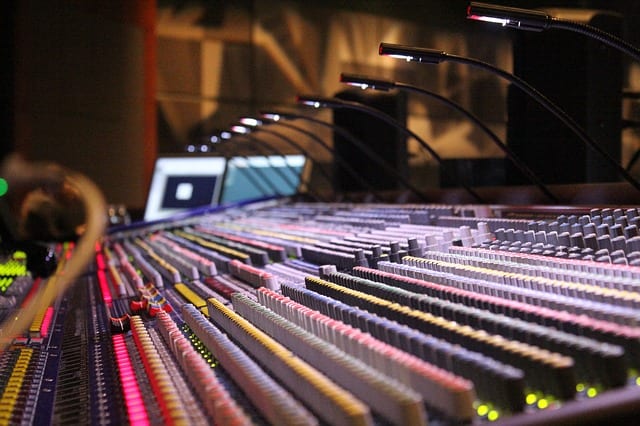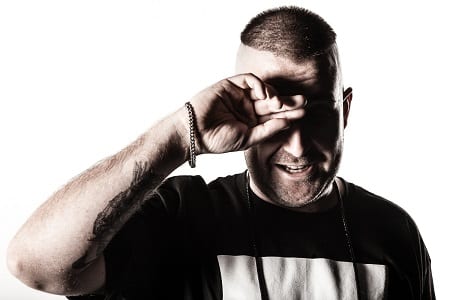Ghost production: Electronic music’s most controversial topic.
One of electronic music’s most consistent, longstanding controversies, too: an unfortunate behind-the-scenes reality since day one, the industry’s longstanding reputation for smoke and mirrors (or cloak and daggers) is embodied by ghost production.
Currently back on the agenda thanks to DJ Mag’s Top 100 debate, I tried to track down a ghost producer and get their side of the shady service and find out more about their day to day operations.
Easy to say, tricky to do. Even the artists I know who have ghosted tracks for big names wouldn’t go near this one… And advised me to back off too. As a last resort, I contacted a handful of the EDM Ghost Producer companies who brazenly exist and seem to offer miracles for those who aren’t prepared to put in the years of studio graft themselves. These companies were quick to get back to me, but shut me down sharp when I started asking questions and not handing over money.
After a month of nudging, hassling and potentially ruining good contacts in the industry I gave up. Two days later, one found me. Through a mutual friend he’d heard I was sniffing around and wanted to explain how things work from his own unique perspective.
With tracks for some of EDM’s biggest DJs (top five of the DJ Mag Top 100) and frequent Beatport number ones to his name – plus a past that includes being a medium weight solo artist with residencies at some of Ibiza’s biggest clubs, the creation of a whole wealth of sample packs and myriad engineering jobs – he’s been around the block a few times, he loves what he does and was happy to share his stories. NDAs permitting.
Read on to find out what life is like through this particular ghost producer’s eyes… Why he thinks many DJs are ‘circus clowns’, why he thinks drum & bass and dubstep hasn’t been affected so much by ghost production and what to do if you ever become one yourself (spoiler: he gets quite controversial at points)
Disclaimer: The videos embedded into this post are purely illustrative/pun-based and have not been included for any other reason.
You’re a ghost producer, then…
I am. I think you’ll be surprised at how many producers actually do ghostwrite for people here and there. It’s easy money!
Is it though? I’ve seen prices on EDM ghost producer sites… $100 per track? You’d have to whiz through tunes with no care or detail to make a living off that!
Don’t get me wrong, there are a lot of ghost writing companies who are pretty scammy and churn out rough ideas and sell them as they are. They’re miles away from what I do; the cost and job will vary from request to request. Most of the time I’ll have something sent to me. An idea or a sketch or bassline notation which I can trigger the MIDI from. I’ll also ask for reference tracks so I know what they want it to sound like. And if the idea is quite strong and the reference points are suitable then I can do a track in a day. If the basic idea is down then it’s a case of designing the right sounds, adding some harmonies or chords and arranging it into a full piece.
So surely if someone is able to put down an idea they should really actually perfect the production craft and not hire someone like you?
Yes. But…. If you’re a singer and guitarist and want to make music for a band then people don’t expect you to write and arrange and record the bass, drums and other instruments. You might have ideas but you don’t play all those instruments.
Then put a band together?
Well yeah, in the world of live music. But in the world of electronic music you don’t have that option; you’re expected to be the composer, the drummer, the bassist, the keys, the mixing engineer, the mastering engineer. A lot of the time you’re expected to be the label owner and marketing manager too. So if you’re making some progress and doing a lot of gigs and you have ideas that you feel will work in your sets then why not hire someone to help you?
It’s a lot to ask someone to be a good DJ, good producer, good composer all at the same time. If you’re earning okay cash getting in gigs and you’re familiar with your DAW then to me it seems logical to get a producer in to help you. I do recommend that they come in and sit in with me so they can learn from it all but that’s not always possible.
How about when people come with really really shit ideas?
I tell them straight and don’t work on it. I only work with people I like and appreciate where they’re coming from. I’m lucky to be in a position to be fussy. If someone sent me a piece of shit I’ll politely tell them it isn’t going to be what they think it is. If they’re asking to be in the Beatport Top 100 then they need to really listen to what’s in the top 100 ask me to make something that’s relevant to that.
Have you ever seen an artist swinging their dick around on social media or interviews making out they made the track themselves?
Not really; the guys I work with are quite humble and when they do have success with my productions they’re not rubbing it in my face type of thing.
But if they did?
I’m not sure…. I don’t think I’d care that much. I’m quite used to it; I’ve heard UK top 40 tracks that use my loops from sample packs I’ve designed for companies. A well known name in drum & bass for instance…
Wow. Have you ghost produced any drum & bass or dubstep?
No. They’re genres I love and have dabbled with in the studio just out of curiosity and love for the sounds, but it’s not something I’ve ever made or been asked to do. The mixdowns and production levels in general are at such a level that it would be hard to pass off unless you’re making it 24/7.
I do know some ghost producers who have made dubstep and drum & bass tracks for artists in those genres. But it’s nowhere near as popular because drum & bass and dubstep celebrate sound design and authenticity. Certainly a few years ago dubstep really pushed sound design to new levels and the idea of having someone make a track for you was defeating the object.
So obviously we’re chatting now because the DJ Mag Top 100 re-kicked the conversation that’s been going on for many years. Do you think this will ever change? Where does it go from here?
It doesn’t go anywhere! This is my argument! People have always had ghostwriters or producers. Big singers or bands don’t always sing their own songs. Big EDM acts are more honest about it now than ever. You see so much outrage and fury in the underground scene but they’re furious at a genre or part of the industry that is miles away from their own; Justin Bieber, Cher, Britney Spears – none of them write their own songs, none of them produce, none of them engineer, many of them lip-sync when you see them live. That’s the absolute truth of the industry and has been for years. It’s just that various forms of music scenes that used to be strictly underground are now in the commercial market and it’s causing an outrage that certain techniques used by the larger side of pop music are now being applied in certain areas of electronic music.
So you reckon people who get outraged about this are getting upset over nothing?
Absolutely. Bottom line; most artists who say they produce their own tunes, do produce their own tunes, certainly on the underground. And most the big EDM guys have publically admitted they’re not the sole producers of their music but people still come and see them perform, like they do with the bands and popstars I just mentioned.
But fans of these artists feel they’re being lied to…
Well yeah they kind of are being lied to, but no more than anyone else in any other musical genre as I mentioned before. But that’s just part of the celebrity-focused world we live in these days. I mean for fucks sake, people pay actual money to go and see some bag-of-dicks degenerate from a z-list reality TV show making a guest appearance in their local club these days. What’s that about? People pay serious money just to be near someone famous, so why wouldn’t those famous people cash in on it? Doesn’t it seem a little more than coincidence that 99% of famous musicians are also really good looking? I’m not saying this is right, quite the opposite, but if musicians (of any genre) got famous for their talents alone, the music industry would be a very different place.
Wow. Fair point when you’re discussing the pop music industry at large. Back in the world of electronic music the majority of DJs aren’t good looking, though.
No they’re not, although that’s pretty subjective. But to be honest, I’ve always considered DJ to be a bit like circus clowns. Fundamentally you’re paid to entertain a crowd of people; you want to make them smile, laugh, be happy by any means necessary. Promoters don’t care if you’re playing a pre-recorded set, for example, as long as they’re getting tickets sold. I gave up DJing a few years ago because of these circus clown politics.
We’re not having this discussion to DJ bash, though….
No no, of course. There are some very talented DJs out there. My favourite is James Zabiela. He embraces the technology and retains the musicality. Sonny Wharton is another one. By the end of their sets I’m hypnotised. So yeah there’s an art to it but it’s definitely been lost by many.
Taking it back to the art of production. You say you can do a track in a day, does that include the mixdown and everything else?
Most of the time. Because I’m a mix engineer I usually mix as I go along anyway. So when it comes to the final mixdown I usually give my ears a break; so if I start at 9am I could have the basic track down by 2.30pm. I’ll stop there, either for the day or to work on something else, and come back to it once my ears have settled and I’m approaching it afresh. But if you mix as you go along then nothing needs that much work.
Okay… So how much do you personally charge to ghost produce?
Every track is different. Part of being a ghost producer is predicting how well a track will do. Would you rather £50 upfront now and £50,000 in royalties? Or £10,000 upfront and no royalties but potentially missing out in £200,000 in royalties?
Wow…
Say a DJ Mag top 10 artist approaches me for a track, I know for a fact that the track will go Beatport top 10 without question. So I’ll charge a very low day rate for getting the track done but I’ll negotiate a credit, royalties, PRS and mastering etc into my contract. I’ve had DJs come to me saying a festival wants to book them but they need a history of releases and Beatport charting tracks. They’re quite honest about it, they say it doesn’t need to be a hit, just something with their name on. So with them I wouldn’t negotiate any credits or royalties – it would be a waste my money on legal fees – so I just say ‘bung me a couple of quid and it’s yours’.
So having a good lawyer is a must-have skill for ghost producers?
It’s a must-have skill for anyone in the music industry! Mine is an absolute whizz. Artists – ghost or not – should pay attention to contracts anyway. Look at what’s happened with deadmau5 and Play. They’ve rinsed his earliest tracks so many times which is why he’s now suing them. You don’t want your old tracks popping up on Beatport and being marketed as if they’re new, do you? So any producer should be aware of this and have a clause about the label not selling the material after a certain amount of time or when you’ve reached a certain level of sales.
It’s important for people know what or who they are creating music for and how it will be used and how it will make money for everyone else in the cycle. For example, the loops I was talking about earlier… When I make samplepacks I know I’ll never see a penny besides what I’ve been paid for the job to make them. I’m cool with that, that’s the contract I’ve signed. Other artists who’ve made samplepacks who, like me, have seen artists hit the charts with those sounds, have been up in arms saying ‘I should be famous now!’ and been frustrated. But that’s the nature of this job.
So I guess if any producer out there reading is thinking of doing a bit of ghost production on the side then they should understand the implications of what they’re selling and who they’re selling it to?
Absolutely. The one thing that bugs me when people discuss ghost producers is the term ‘sell out’. I think ‘hold on, I’m not after fame and fortune, I never have been’ I’m just a big dance music fan and I love tech and synths and writing. My love is in the studio and that’s what I get paid to do. The definition of a sell out to me is someone doing something they don’t love for money. My work – as a mix engineer, sound designer and ghost producer – has paid for a very nice studio, a lot of beautiful synthesisers and a nice life. I don’t think that’s selling out at all.


